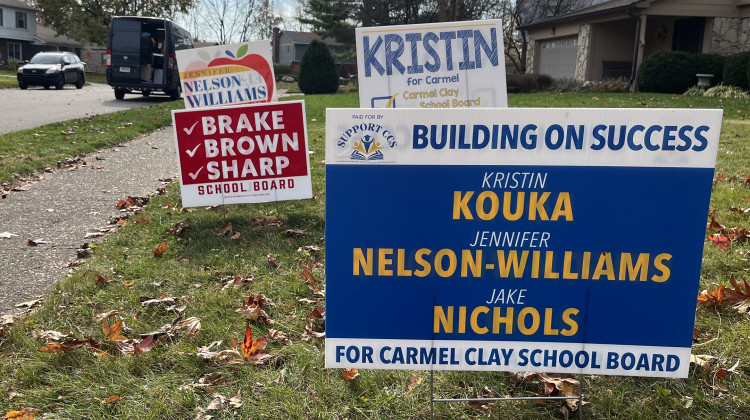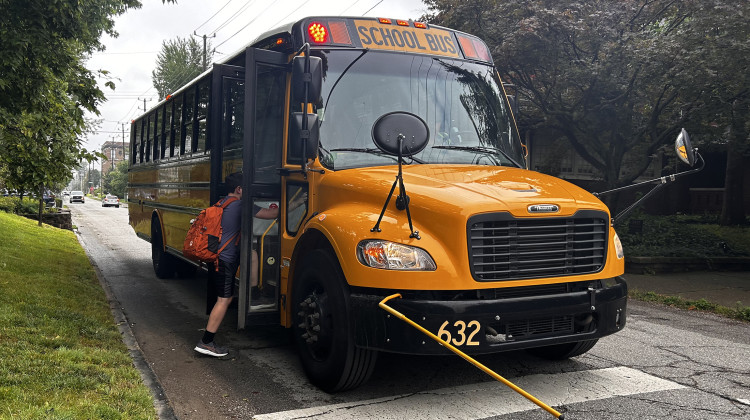
Campaign signs for Carmel Clay School Board candidates who are running in the 2022 primary election. Three seats on the five-member board are up on the ballot.
Jill Sheridan/WFYIStephanie Flittner is a conservative from Carmel, an affluent suburb north of Indianapolis, and she’s active in local Republican circles. So Flittner was surprised when a group of conservatives in her community asked her to back out of the local school board race.
“They're like ‘we're afraid that too many Republican candidates will split the slate and, essentially, we won't be able to take over the board,’” Flittner said.
Candidates are vying for three open seats on the five-member Carmel Clay School Board.
Flittner said the message came from the joint campaign of Jenny Brake (District 1), Greg Brown (District 3) and Adam Sharp (District 2) — a slate of candidates who claim that teachers are indoctrinating students into liberal ideologies.
The slate is supported by the Hamilton County chapter of Moms for Liberty, a national conservative parent advocacy group.
Conservative school board candidates across Indiana are campaigning on so-called parental rights platforms — from Evansville to Avon to Kokomo. Parental rights has become a rallying cry for those who oppose mask mandates and believe that schools are teaching students critical race theory — a theoretical framework that’s been conflated with diversity, equity and inclusion efforts — and promoting LGBTQ identities.
UPDATE: Anti-CRT, pro-parental rights candidates win seats on Hamilton County school boards
Despite a lack of evidence, these claims have become a common theme in school board races nationwide. Moms for Liberty, the powerful and controversial conservative group, rose to prominence by opposing mask mandates, CRT and social emotional learning. The group wants to install like-minded people in school board seats across the country.
But that’s not why Flittner is running against three other candidates for District 1. While she identifies as a conservative, she doesn't think being a school board member should be a political position. Local school boards in Indiana are made up of non-partisan officials — nearly all are elected.
Flittner refused to back out of the Carmel Clay school board race.
“And I was told, ‘Well, I hope you realize this is going to get really heated,’” she said. “But I'll say the only heat and the only mudslinging that I've experienced has been from that very campaign, which is ironic.”

Rumors, angry phone calls, and a cease and desist letter
Flittner described the race for school board as “the craziest thing I’ve ever been involved in.”
During the campaign, she heard rumors from others that she was secretly a liberal who supported teaching critical race theory in schools, Flittner said. She also heard whispers that she didn’t have children in Carmel schools. Flittner is the parent of a first grader in Carmel Clay schools and a soon-to-be kindergartener.
Flitter said her husband, who operates a Medicare insurance business, received calls from clients who were furious she supported CRT. Flittner said she does not support teaching CRT in schools. She said the district has a transparency issue — not because they are secretly indoctrinating students — but because they haven’t done enough to counter misinformation about what’s happening in schools.
Flittner, an attorney, said she believes the rumors originated with the Brake, Brown and Sharp campaign.
“I had to send their campaign manager a cease and desist letter,” she said.
WFYI reached out to the Brake, Brown and Sharp campaign four times for comment. The campaign did not respond to these requests by a Sunday deadline. Their campaign manager, Jennifer Hendrix, refuted Flittner’s claim that she was asked to drop out of the race.
“My recollection is that we discussed how best to avoid splitting the vote, but in the end, the decision was up to her and the other candidates,” Hendrix wrote in an email.
Hendrix also denied spreading rumors about Flittner.
“It is true she sent me a cease and desist letter without any evidence of wrongdoing, only hearsay and accusations that I spoke ill of her,” Hendrix wrote.
In a joint campaign video published online, Sharp said: “a vote for us is a vote for complete transparency in the school system, academic excellence and a focus on parental rights.”
After an email sent by the Brake, Brown and Sharp campaign on Halloween claimed teachers were indoctrinating students, Carmel Clay Superintendent Michael Beresford posted a video. Speaking into the camera, Beresford said a political narrative circulating in the community "targeting teachers” is false and insulting.
How national issues define local school board races
What’s happening in Carmel is not unique.
“Part of what is so unusual about what's going on right now is that the list of issues that's coming up in Indiana is coming up all over the country,” said Jon Valant, a senior fellow and director of the Brown Center on Education Policy at the Brookings Institution.
Valant said the nationalization of school board elections under the banner of parents’ rights is a response to school policies related to COVID, as well as diversity, equity and inclusion measures.
Following the May 2020 murder of George Floyd by a Minneapolis police officer, some Indiana communities began demanding school leaders address systemic racism and racial disparities in education.
That led to school districts and charter schools issuing anti-racist proclamations and support of the Black Lives Matter movement, auditing the fairness of their policies, and amplifying recruitment of Black and Brown educators.
In 2020, candidates for local school boards in the general election made racial equity a centerpiece of some campaigns. This was a significant development for Hamilton County, where Carmel is located; candidates for multiple district boards addressed concerns of Black and Brown students who said they faced racism and bigotry at their majority White schools.
White students make up nearly 71 percent of the Carmel Clay population, followed by Asian students at 15 percent, while Black and Hispanic students each make up about 3.5 percent of enrollment. In Hamilton County, about 82 percent of its 100,000 residents are White, according to the U.S. Census.
Around the same time, the Trump administration began to target diversity programs in federal government and critical race theory — the decades-old academic framework intended to explain how people of color are impacted by cultural perceptions of race, inequality and structural racism.
Soon a fast-paced, nationwide movement of parents and right-wing groups began protesting at school board meetings across the country. Teachers and administrators were accused of teaching CRT in the classroom and pushing radical left-wing ideologies on students.
Leaders at Carmel Clay and Noblesville schools attempted to push back against the misinformation, but were often met with jeers in public meetings. Leaders at both districts have stated they do not teach critical race theory or promote political ideology.
The districts were among the nearly 900 in the country who faced anti-CRT protests between September of 2020 and August of last year, according to a report released by a University of California, Los Angeles institute.
Earlier this year, Indiana GOP lawmakers followed a national movement of majority Republican states to introduce legislation to ban or limit the discussion of race, sex and politics in the classroom. But despite Indiana’s Republican supermajority, that legislation died in the Statehouse as some lawmakers and conservative parents disagreed over the bill’s language.
Valant of the Brookings Institution said the election of Virginia Gov. Glenn Youngkin, a Republican who campaigned on a platform that emphasized support for parents’ rights, proved the message connected with frustrated and largely conservative voters.
“And it is a distortion,” Valant said. “You can say that parents have a right to anything…It's really like, at its core, a pretty flimsy idea of parents’ rights, but it's potent politically.”
And campaigns on parents’ rights have included misinformation about what’s going on in schools.
Opposition to critical race theory, alleged indoctrination and grooming of students has been used to justify book bans and implement anti-LGBTQ policies. Valant said that’s harmful to students.
“I think when you let these bad and dangerous ideas fester, they become more dangerous, and they become worse, and they have more impact,” he said.

High-profile endorsements from Republican leaders
And some of these races have drawn support from high profile conservative politicians. The Brake, Brown and Sharp campaign in Carmel received endorsements from Indiana’s Republican Attorney General Todd Rokita and U.S. Sens. Todd Young and Mike Braun.
“Republicans see education right now as a potentially winning issue and a potent campaign issue, which is unusual, historically,” Valant said. “And right now, a lot of Republicans see an opportunity to sort of win races, beyond just school board races, but win races for governor, for Congress.”
Laura Merrifield Wilson, associate professor of political science at the University of Indianapolis, also said these kinds of endorsements are “highly unusual” in Indiana.
Wilson said school board races have historically been overlooked by voters due to a lack of information and media attention.
“Oftentimes [voters) can’t identify the incumbents, they may not be able to point to very specific obligations or responsibilities of [school board] members,” she said. “And they are, this is most important, highly non-partisan.”
Earlier this year, Republican state Rep. J.D. Prescott (R-Union City) authored a bill that would require school board candidates to identify with a political party and include that designation on the ballot. Currently, candidates can choose to volunteer political affiliation in their campaigns.
"When I look at Republicans or Democrats I think you can tell the difference between financial responsibility and moral character in some cases," Prescott said during a hearing on the legislation.
The bill did not advance.
But political affiliation has played a significant role in the school board campaigns taking place in Hamilton County.
A national tax-exempt organization called Free to Learn Action, which advocates for “classrooms free of politics and activism,” funds multiple websites that include the political affiliations of candidates in school board races in Hamilton County. These sites emphasize the political views of candidates registered as Democrats, including donations they’ve made to organizations like Planned Parenthood as part of online fundraisers, as well as their views on diversity, equity and inclusion measures.
Jeffrey Henig, professor of political science and education at Columbia University’s Teachers College, said national actors have zeroed in on school boards because they see teaching students about race, gender and sexuality, as well as COVID policies, as a way to motivate voters, especially suburban swing voters, to cast their ballots for Republicans.
“What's valuable from the standpoint of the national actors is these themes can fit together in a story about the abuses and excesses of the liberal left,” Henig said.
Influence from outside groups and endorsements from partisan elected officials illustrate that much of the conversation in these races is about national issues.
“And I think it oversimplifies for voters what's going on in their particular school district, and what's important to their local communities. And it's providing a false sense of universal reality,” Wilson of the University of Indianapolis said.
Henig said much of what is discussed and decided upon by school board members has little to do with national politics.
“I do think we should be concerned when highly polarized national debates get injected into local arenas, and pull communities apart that had worked fairly well together and harmoniously when issues were framed in terms of local questions like, ‘do we need a new high school?’ ‘Is this principal or this superintendent effective?’,” Henig said.
Henig said the nationalization of school board races could lead to less compromise and more dysfunction and polarization.
School board members do not oversee the day-to-day operations of a school corporation, but rather provide oversight. They are also responsible for hiring the superintendent, approving the budget and creating policies for staff and students.

Frustrated parents push back
Diane Hannah, a Carmel Clay parent, is concerned by the outsize influence national politics have had in her local school board race.
“These national politicians have more of a voice in our local schools than the actual parents who have actual kids in the schools,” Hannah said. “That doesn't make sense to me”
Hannah, a Democrat, moved to Carmel because the school district had made a commitment to diversity, equity and inclusion. She said the school corporation has a long way to go, but she’s pleased with the progress.
Last school year, Hannah said her son came home from kindergarten and said “I don’t want to be Jewish, because all Jews are liars.”
“That was not a happy moment,” said Hannah, who is Jewish. But she said she was happy with the way her son’s teacher addressed the issue. She said her son’s teacher shared how she was going to discuss multiple winter holidays and showed her the classroom material she would use in those lessons.
“But Carmel has issues, and the teachers need to be able to speak freely to correct those things,” Hannah said.
Hannah now volunteers for a political action group, Support CCS, that supports a slate of candidates who agree that the district should continue its diversity, equity and inclusion efforts. These candidates are: incumbent Jennifer Nelson-Williams (District 2), Kristin L. Kouka (District 1) and Jake Nichols (District 3).
Two other candidates not part of a joint campaign are also running for the board: Sheldon Barnes (District 1) and Lori Long (District 2).
Hannah said she and other parents are frustrated by misinformed claims that Carmel Clay teachers are indoctrinating students. But Hannah said that frustration has led to action.
“People are talking to their neighbors. People who've never been political before, who've never talked about an election before, are knocking on their neighbor's doors and saying, ‘Hey, I know, you know, maybe you don't have kids in the school district. But here's what's going on. And can you please vote in this election? Because we need as many votes as possible.’”
Hannah and Stephanie Flittner, the Republican mom running for the Carmel Clay school board, don’t align politically. But Flittner agrees that national political talking points and misinformation shouldn’t be a part of local school board elections.
“What I would call that is a cheap tactic to fearmonger into votes. And as a conservative, I'm not OK with that,” Flittner said.
The midterm election is Tuesday, Nov 8.
2022 Carmel Clay School Board election candidates:
District 1
Sheldon Barnes
Jenny Brake
Stephanie Flittner
Kristin L. Kouka
District 2
Lori Long
Jennifer Nelson-Williams
Adam Sharp
District 3
Greg Brown
Jake Nichols
Contact WFYI education reporter Lee V. Gaines at lgaines@wfyi.org. Follow on Twitter: @LeeVGaines.
WFYI education editor Eric Weddle contributed to this story.
 DONATE
DONATE






 Support WFYI. We can't do it without you.
Support WFYI. We can't do it without you.